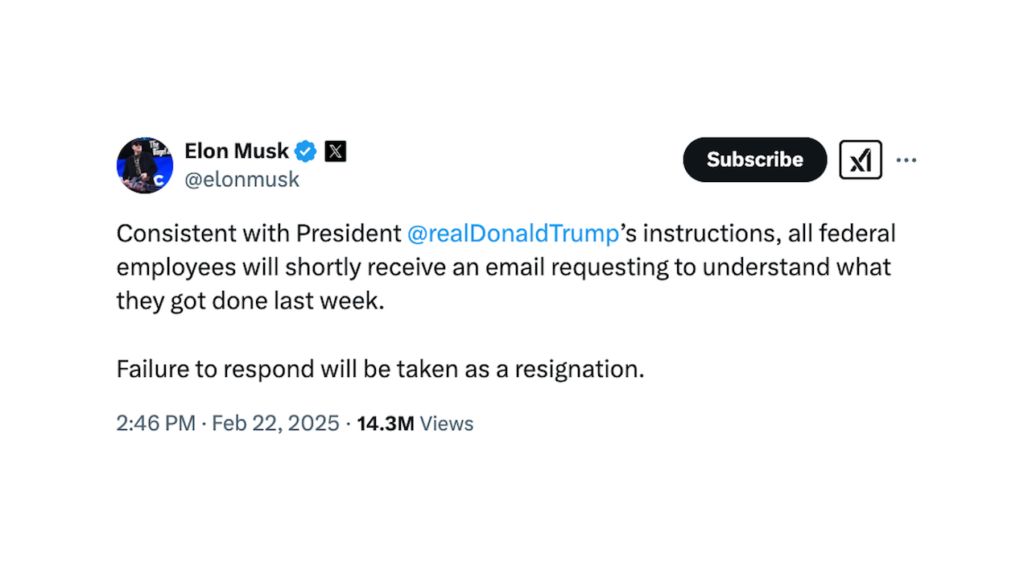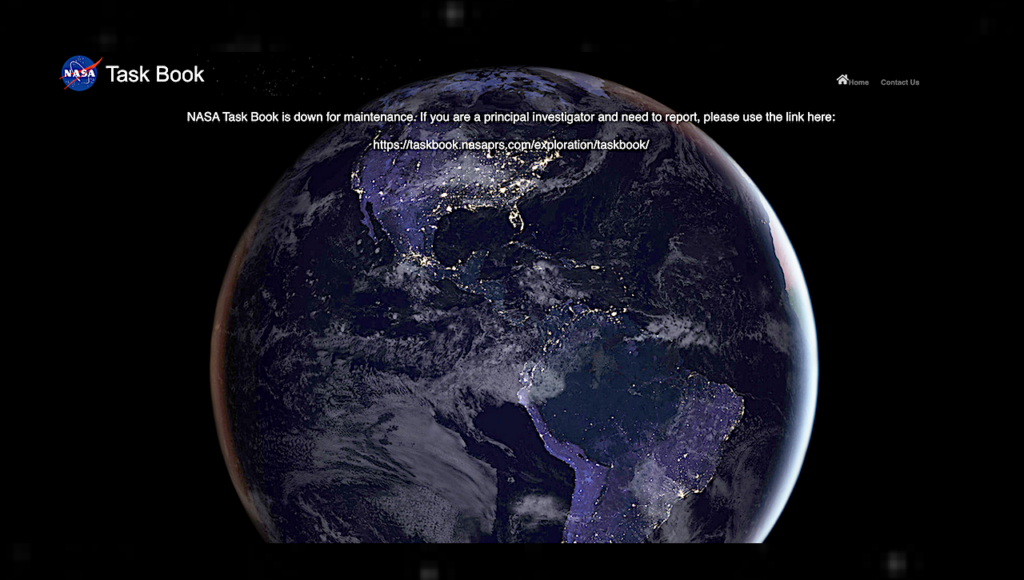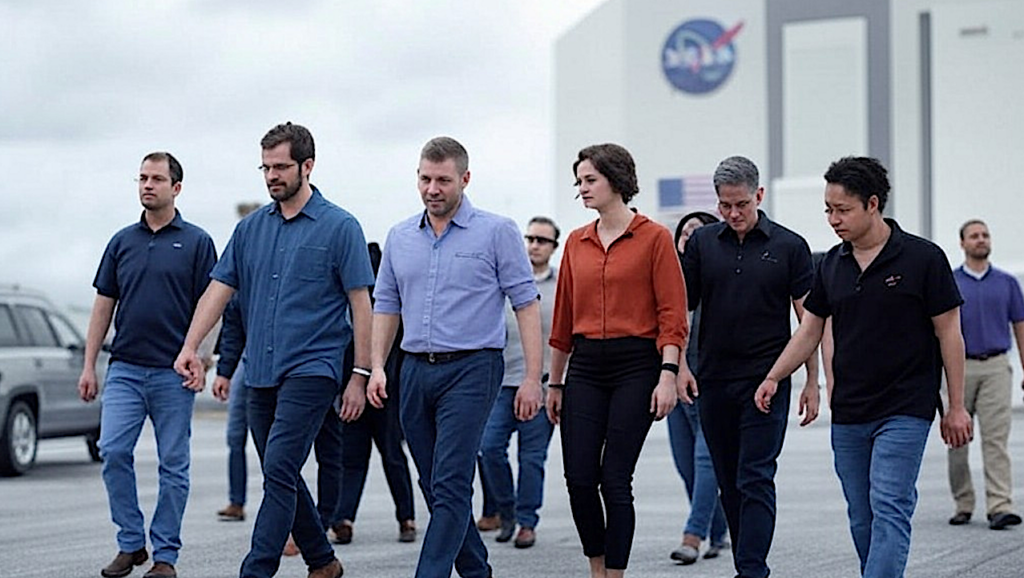TrumpSpace Details Emerge

Some additional insight into the Trump Administration’s space policy was revealed today in Washington DC. Meeting at the Cosmos Club, attendees at the 11th Eilene M. Galloway Symposium on Critical Issues in Space Law heard from a number of speakers including former Congressman Bob Walker, who is advising the Trump Transition Team, and Rep. Jim Bridenstine (R-OK) who has been conducting a behind-the-scenes effort to become the next administrator of NASA.
Walker spoke first and said that the Trump space policy came together rather quickly at the end of the campaign and that he was asked to come up with one and deliver it – the next day. He cautioned the audience that just because he wrote some things this is not indicative of where the Transition Team – and the incoming NASA leadership – would necessarily go. That said, Walker said that there is an intent that the National Space Council be re-instituted so as to guide all space activities. civilian, military, and commercial. Walker went on to say that the Trump team is looking for a space policy that is “disruptive, resilient, and enduring”.
For one thing, Walker said that they are looking for a much longer life for the ISS – and that it will need to be refurbished and upgraded. He speculated that it would need to be handed over to an organization or consortium eventually. They are also looking for opportunities to have the commercial sector backfill for NASA so that NASA can focus on deep space exploration. Walker was very clear on this point noting that there was an awareness of many government programs that “take a decade to do with technology that ends up being out of date”.
At no time did Walker discuss NASA’s Journey To Mars, or any other destination such as the Moon, preferring only to refer to “deep space exploration”. To be fair, no one specifically asked him about these topics.
Walker said that he was not on the Trump Transition Team itself but that he was advising the Transition Team. When I asked him if he had any interest in becoming NASA Administrator he said “No”. He did say that he had an interest in working with Newt Gingrich on broader issues in addition to NASA.
Walker was asked several times about SLS/Orion – in the context of Trump’s recent comments about Boeing and Air Force One. Walker did not answer the questions specifically but went into a broader generalization that Trump is not a politician but rather that he is a deal maker. He also thought that Trump’s funding of an ice rink in New York a few years back was a good example of what kind of president he’d be. Walker went on to say that Vice President-elect Pence would be the de-facto “prime minister” and run the government while Donald Trump went out to cut deals.
The issue of Earth science eventually came up. Walker said that the Trump administration is not looking to cancel NASA climate science but rather that they wanted to transfer all of it to other agencies who might have greater expertise. Earth centric research would be transferred so as to allow NASA to focus on space exploration.
As Walker concluded responding to questions the meeting had a coffee break. Walker continued to talk to audience members as they got coffee. At one point Rep. Jim Bridenstine (the next speaker) showed up accompanied by a nervous-looking staffer (Looks like Bridenstine Senior Policy Adviser Christopher Ingram aka @cwingraham ?). Bridenstine went over to Walker and said “good to see you again”. After a short chat between Walker and Bridenstine it was time for Bridenstine to speak.
Bridenstine read from prepared remarks that were identical to things he has said in public before. He is worried about China and space-based threats and made little mention about exploration or other issues that confront NASA. His biggest interest seems to have to do with who should manage space traffic. Answer: the FAA – not DoD.
When it was time for questions, Bridenstine said that he was too busy with other things and that he “had to run”. I raised my hand hoping to try and get him to answer a question i.e. “are you still trying to become the next Administrator of NASA” but Bridenstine woud not allow me to ask him a question – his eyes darting over to his staffer who was standing nearby as my hand went up in the air. Instead, he rattled off an email address for me to send an inquiry to and then made for the door with his staffer. In other words, no comment – see ya later.









I believe a lot of people keep forgetting President Obama’s first NASA budget proposal. It was PRAISED by Walker.
“Despite the shrieks you might have heard from a few special interests, the Obama administration’s budget for the National Aeronautics and Space Administration deserves strong approval from Republicans. The 2011 spending plan for the space agency does what is obvious to anyone who cares about man’s future in space and what presidential commissions have been recommending for nearly a decade.”
http://www.washingtontimes….
Congress totally shot that budget down but it was closer to actually funding President Bush’s “The Vision for Space Exploration” than it got under Griffin.
The 2000s Congress forced NASA to retain shuttle derived. Expensive, but a significant amount of knowledge/critical thinking skills resulted along with all the not so good: NASA had to design a HSF LV that could not get off the ground and mothball a new test stand (did provide good jobs vs welfare).
Many real leaders have had no impact on Congress as flexible path and depot centric with goal of reuse is simply the most logical path forward. Science missions with common LV configurations provide demonstrated reliability to reduce transportation costs and risks, shifting excess LV$ to missions. Congressional ‘leaders’ refused to ‘market’ or announce this plan to the general public, and a USG agency gets the blame for not being a good caretaker of public funds-but SLS/Orion is *not* on any list..nor will they answer questions.
https://www.lankford.senate…
Unfortunately, the 2017 bill includes the phrase “once this capability is established it shall be retained” so fly an Apollo 8 flyby and, despite all the rhetoric, phase out the best path forward. Further, placing climate change deniers in key admin roles lends credibility to false news stories (USG websites!) and Congressional testimony to support their ‘beliefs’ not facts? Be careful what you wish for.
There are those here with better direct memories than I have of the decimation Southern California suffered as a well-established aerospace industry was- well, largely destroyed as the nation enjoyed a “peace dividend” at the end of the Cold War. This would have been the early 1990’s and during the Presidency of George HW Bush and contributing to his failure to secure a second term.
The point is at least in part an answer to concerns post-shuttle of losing a valuable work force, something we shamefully managed at least once before. These concerns are real. Southern California once employed 260,000 in aerospace; according to the LATimes, while the industry is showing some growth it currently employed around 80,000. There are a lot of broken lives in those numbers, and a critical loss to the nation.
I think of this whenever the criticism of Sen. Shelby reaches screeching proportions. And while I’m not willing to assign lofty motivation to the Senator, the effect is the same.
The idea that some of NASA’s budget should be devoted to “welfare for aerospace engineers” is not a new one. Multiple iterations of redesign had to be done to adapt the Shuttle, from the low-cost operational cost vehicle it was originally conceived as, to one whose operations kept a large portion of the Apollo workforce employed. Which employment was the single largest reason why Shuttle was no longer a low-cost operations vehicle. Congress wasn’t willing to tolerate that low-cost, which reduced dependent voters.
The best widely known definition of the industrial revolution, with all its implications for high industrial levels of productivity compared to agrarian societies that preceded industrial society, was given by Arnold Toynbee:
“When a society shifts its allocation of resources from allocation by custom and tradition (read here, politics) to allocation by markets, it may be said to have undergone an industrial revolution.”
While it *is* true that, when a government program sustained over years, ends, there will be changes in employment, those changes *never* had to mean less industry-wide employment. What that required, however, was that politicians had to let go of *some* degree of control over allocation of the resources previously involved, in order to allow those to be allocated by market-oriented groups, instead of themselves.
Even dropping from the levels of control offered pols by the Federal Acquisition Regulations and cost+ contracts to the levels of control offered by Space Act Agreements would have left large numbers of people still employed. This would have been true in either the transition from Shuttle to Commercial Crew, or even more so, in the transition from Apollo to its replacement by a low-cost operational vehicle. That reduction of the exercise of political power, Congress has all too often been unwilling to do.
There will be no extension of industrial society into the Solar System until the majority of resources needed for that are allocated by markets, as Toynbee understood 130 years ago. That is why I am not willing to excuse Senators Shelby, Nelson, et al, their intention to keep the people holding the jobs of Shuttle/SLS/Orion programs dependent on their patronage.
This happens in industry all the time. Things change, past jobs are no longer needed, but they don’t want to fire people. The solution is to train them to do different jobs which are now needed. Inventing make-work projects to let people keep doing what they have always done is just poor management by those in charge and conservatism (not the political sort) by the workers.
“Walker said that the Trump administration is not looking to cancel NASA
climate science but rather that they wanted to transfer all of it to
other agencies who might have greater expertise.”
The simple fact is (if facts matter anymore) that NASA has more expertise/experience in earth observations from space, and the climate (or, more broadly, earth) science obtained from those observations, than any other government agency.
So Walker either doesn’t don’t know the history behind NASA’s role in earth science, or he does and is simply blowing smoke. My money’s on the latter.
There are many examples of transfers of work where the capabilities and expertise are lost. When the expertise is merely diminished inside the USG, a single revolving door civil servant can have a huge impact on regulations, which leads to corporate profit, not to mention the wrong public perception on the issues. Environment vs short term gains with nothing set aside for the future generations–denial limits liability.
NASA/NOAA Satellite data has played a key role establishing that burning oil and coal and leaking natural gas perturb the earth’s atmosphere to increase its’ bulk temperature. What better way to limit liability than to transfer the work and pretend it makes the government ‘more efficient’.
A key regulation is gas leakage, where above ~3% its worse than coal and the detection and leak suppression equipment cuts into profits…but lets try to fool the public by not providing the data and critical thinking required. An example:
Utility companies are required by law to inspect their lines for safety and fix safety problems within a specified time. But these rules don’t require the repair of all leaks!
https://www.edf.org/climate…
There are those working to redefine leaks as safety- related, but this effort will end.
I guess I’m missing something. What sort of gas leaks are _not_ a safety issue? I suppose very small or slow ones wouldn’t be, and those are probably more common. But if someone told me there was a gas leak in my apartment building, safety issues would be one of the first things I’d wonder about.
Congressman Bill Posey’s office told me the same thing. They wanted NASA to stop climate research because other agencies were also studying it. However they did not intend to provide additional funds to NOAA or one of the other agencies. A recent NOAA funding bill (supported by agricultural interests) authorizes improvements in weather prediction up to two years in the future, but apparently prohibits looking any farther into the future.
This will provide a excellent cover for the new admin.
The NASA/NOAA data helped the EPA set the first ever standards to cut methane emissions from the carbon sector. Methane affects the climate ~ 25 times greater the CO2. Climate benefits: $690M outweighed the cost: $530M.
Industry’s profit goes up by not eliminating leaks and not protecting the future generation: cut the ‘gov regulations’, no carbon tax. To limit liability, Congress will continue its assault on ‘one-stop shopping’ for climate information where demand is skyrocketing. USG websites can become little propaganda sources instead of a science source as well with Admin ‘help’–>deplorable.
https://www.epa.gov/newsrel…
https://www.washingtonpost….
https://www.theguardian.com…
http://www.upi.com/Science_…
https://insideclimatenews.o…
Why not transfer the people on these projects too?
You wouldn’t only need to transfer the manpower (I can imagine the bureaucratic nightmare just that effort would cause). You’d have to transfer their computers, their antennas, their ground measurement instruments (NASA takes measurements from earth as well, to help calibrate the space instruments), their (well, you get the point).
And once you transfer them, where would you house them? You’d have to build new NOAA facilities. Or maybe you’d simply declare that everything en masse was now managed by NOAA. But how would that work, since everything is already located at NASA facilities, using NASA’s infrastructure? That would lead to even more bureaucratic nightmare.
Even if you managed to do all that, you’d have to somehow merge NASA’s management structure for this work into NOAA’s. And believe me, they are totally different.
Given the amount of money this would entail (not to mention the upheaval it would cause), I don’t see how this would streamline and focus the government’s earth science efforts.
Clearly transferring the actual earth observation capabilities that NASA already has in place is not the intent. The intent is to marginalize earth observation data as much as possible. Transfer it out of a prestigious organization (NASA) to another that is far less known and respected by the public (NOAA) so that any data collected can be largely ignored. The fact that the actual data collection capability will be diminished is just icing on the cake.
That’s a little harsh on NOAA. That organization is actually a leader in the international weather community and is one of the backbone organizations in the global weather monitoring system developed via treaties, etc.
The suspicion here is that the rhetoric that NASA’s earth science efforts will be transferred is just that (rhetoric), while the reality would be that the efforts would be severely curtailed (or eliminated).
The fact that it is not cost effective (nor does it make much sense regardless of cost) to make such a transfer helps lead to that suspicion.
My intent is not to be harsh with NOAA. They are an undisputed leader in the international weather community. My intent is to be harsh with the politicians who want to transfer earth observation capabilities from NASA to NOAA.
In the eyes of the American public, far fewer of them know what NOAA is and does compared to NASA. This is about perception, not reality. The perception is that climate change data coming from NOAA (an organization many voters don’t know about) is less trustworthy than NASA. This will let the climate change denying politicians continue to perpetuate the myth that climate change does not exist.
The majority of people in the US have no idea of NASA’s role in earth science. In fact, my guess is that most people already believe that any earth science information released from the US government comes from NOAA, the EPA, or maybe the USGS (anyplace other than NASA). As a result, many in Congress can go ahead and say they will severely reduce NASA’s roll (or transfer it to NOAA) without any public pushback.
By the way, It’s not as if Congress (Republicans, actually) support climate studies at NOAA either:
http://tinyurl.com/j9r9yv7
Excellent point. Congress has NO intention of letting ANY government agency study climate change. Since (SFAIK) every single Trump appointee is a climate change denier, and Mr. Trump himself has said it is a Chinese hoax, Congress and the Administration should be in perfect harmony on this. Recent appropriations for improved weather forcasting at NOAA set a hard limit of two years on the distance into the future that could be studied, since this was demanded by the farming interests.
The irony is that the globe will continue warming whether we study it or not. In a few years when we start to see obvious effects, one can anticipate that Trump (if he is still in office) and Congress will simply blame it on China and India, to wild acclaim.
Seriously? Why would you do any of that? Don’t make a straw man argument here.
Entire projects, including equipment and used buildings would be transferred to NSF or NOAA or whatever agency that takes over. Shared facilities will be granted to one or the other organizations and rent payments made by the leasing tenant. Full cost accounting and regular audits give the business intelligence necessary to organize such a transaction.
This happens literally every day in industry as companies are sold or departments spun out.
OK, assume everything is transferred to NOAA. I still believe it would create quite a bureaucratic mess (and a fair amount of upheaval). But even if you don’t think so, it would entail some cost (everything has a cost). And for what? All you would do is spend money (and time and effort) to essentially change the agency name on the nameplates of people’s doors. Why bother?
(BTW, I can think of a lot of instances where companies tried to merge, or one company bought another out and tried to incorporate the remains; the outcomes didn’t turn out so well. Why run that risk here?)
But, again, I think this idea is just a feint and that it’s not the plan anyway.
Honestly, I can see one advantage. To a large extent, science at NASA is discovery-driven. When projects report to headquarters, it’s about what _new_ things they have done. Saying you’ve continued to make the same, excellent quality and highly valuable measurements you’ve been making for the past decade just doesn’t get as warm a reception. For things where decades of good, consistent data are required (say climate monitoring), NOAA is institutionally better suited.
Have you tried to get past the front gate at JPL recently? They have gotten very restrictive in the past few years. It’s gotten to the point where NASA employees from other centers can’t visit without having their names submitted to security weeks in advance, and even then, they might end needing an escort. If you turned over some of their facilities to NOAA, how would the now-NOAA employees get to their offices?
Security would allow them access, as they work there. It is not like this is a problem that has not been encountered and solved ever in the history of humanity. We can send a man to the moon but we can’t tell a security office to let through two different types of badges?
You seem to be going back and forth on a key point.
We obviously could reform, alter and modify JPL security and the management culture which let it get out of hand. But you were specifically talking about transferring facilities and people _without_ making major changes to the institutions involved. Without some major changes, no. I don’t think the guards at the gate would let NOAA employees in on a daily, free-access basis.
I find it very hard to believe that it would be so difficult to train security officers to allow two types of badges through the gate.
Let me try again. Training the guards isn’t the issue. That’s easy. (And it would actually be synchronizing databases, since the system uses magnetically coded badges and card readers.)
The badges are only issued after a fairly involved process including background checks and other vetting. JPL has to certify that their process follows NASA policies and a Homeland Security Presidential Directive. (Note that, when the current system was implemented, a group of employees sued over the process being excessive. That went all the way to the Supreme Court, and I’m summarizing the lab’s stated position from that case.)
Since they don’t know and can’t control the process used by another government agency, or even another NASA center, they will not accept those badges for unrestricted entry to the lab. You aren’t talking restructuring the lab’s whole security bureaucracy. And that’s just one example of the snarls you’d run into if you tried “simply” handing over NASA facilities to NOAA.
I am aware of JPL’s uniqueness but again, how difficult is it for NOAA employees at that site to undergo the same background checks? This isn’t any different from the system that is in place now, it’s just that NOAA would be footing the bill for their people. The ones that are there at the time of the handover wouldn’t have to redo any checks.
Actually, JPL isn’t unique. The same issues exist at Goddard, Johnson, Kennedy, etc. I only described the issues at JPL because I am most familiar with their process.
You are saying that these problems can be solved. That is certainly true. But doing so would involve a fair amount of time and money. That was the original point. Shifting work from NASA to NOAA would not be a trivial exercise and it would require a significant amount of time and effort. Far more than changing names in an org chart and telling guards to accept badges from two agencies.
If you say so. You haven’t actually presented anything other than assertions to that fact though. But we’re not going to settle this on a web forum in any case.
It looks to me like the thing that these folks want to do is to separate the respected and world-renowned NASA brand from NASA’s ongoing Earth climate science discoveries, hard hitting science which presents such a powerful threat to their pals in the fossil fuel industry. A NOAA label has a tenth or less of the prestige that a NASA label brings to the latest climate research announcement.
Congress has no intention of actually funding NOAA to do any climate research either. The recent announcement of the GOES-R launch by NOAA Administrator Dr. Kathryn Sullivan delicately neglected to mention its potential value in climate research far beyond the ~2-year window that Congress considers necessary for its agricultural supporters.
The most important question for both SLS/Orion and for NASA Earth Science funding is the time the President is willing to spend on deals surrounding it. Space is not politically important outside NASA Center districts, because its support is “a mile wide and an inch deep”. In 2009, while Obama was willing to give our space cadets the chance to draw up what was arguably the best space policy of NASA’s history, he was no more truly interested in spaceflight than in 2007, when he proposed to cancel NASA altogether, and send the money to his education cronies in academia. So, when the inevitable horse-trading started that gets any large budget in D.C. passed, he not only would spend little or no time on the dealing, but gave the space cadets the equivalent of a single previously rented broken-down mule as their political capital in the horse-trading.
If Trump does the same thing, then Congress will do what they did to Obama’s space policy, …that is, whatever they please.
*If*, however, Trump is willing to spend time and resources “doing a deal” with Senators Shelby, Nelson, and the rest of the SLS/Orion coalition, then he can forthrightly propose replacing the funding of SLS with funding for propellant depots, funding for ISRU, funding for Life Support, funding for propulsion technology, …etc. God knows there is more than enough that needs doing. What he *cannot* do in this bargaining is guarantee the jobs of all of the specific people now in place at MSFC, at KSC, and at the contractors, who worked on the Shuttle. To the extent that these specific people going without work weakens Senators Shelby, Nelson, et al, ( On top of the fact that 10-20 smaller replacement line items in the budget are more costly in ‘political favors’ for committee members than 2 line items called SLS and Orion) Trump will have to pay some further political price, …if he is willing.
On NASA Earth Science, Trump’s commitment is directly opposed to the current holders of the jobs involved in Hansen’s Funding Hierarchy. The “Atari Democrats” had climate science as an “issue” since the late 1970s. After Senators Wirth and Gore got together with Activist James Hansen, they began building a funding hierarchy that ladled out Earth Sciences money on the basis of how well research teams supported James Hansen’s activism. When he became head of GISS, and “keeper of the data”, his influence was unchallenged for over 15 years. Hansen’s Funding Hierarchy, extending from Congressional Committees on downward through NASA and its funding peer review groups, to local researchers around the country, is the specific target of Trump’s Earth Science policy. Money will still flow for Earth Science, but it will flow through different channels, with different decision-makers, with priorities not at all in line with the activism that James Hansen cultivated in the field.
It is quite possible that just as much money will flow, and probable that even more data will flow, to Earth Science from government programs. It simply won’t be done through the same people, with the same activist priorities, deciding who gets funded and who doesn’t. It is highly likely that people who are AGW “skeptics” will be funded as well as those who are “alarmists”. This “deconstruction” of Hansen’s Hierarchy will still require funding, but the deal-making will become complex when researchers complain to their congressional patrons about just *who* is now handing out money. Their old mentors and friends will be gone.
Wow. Just wow.
You misunderstand the nature of science itself. Science, unlike politics, is not decided based on political views. It is discovered, by careful observation of the real universe around us. The world is what it is, not what you might want or believe it to be.
Daniel, I know what science is quite well. My first presentation to a class on it was in 1965.
What I was describing was not science, but the funding of science. *That* is most certainly politicized. It has been more and more politicized since at least the day in 1950 when Harry Truman announced to the nation that the US would be building a Hydrogen Bomb. He did so before he went to the people supervising the AEC and told the physicists who would be doing it that they had approval to proceed, even though the Teller-Ulam device was not yet fully conceptualized, much less analyzed, …all in response to the nation’s unease over the Soviets’ first nuclear explosion.
Yes, the world is what it is, and a significant part of that world is that many voters no longer trust government funded academic activists to do science that might impugn their activism about government policy over climate change, …in case you had not noticed. That’s a variant on the current non-progressive reaction to the slow-building academic arrogance over the last 60 years toward those who are not academics, or are not academically affected in their worldview. That reaction is a very large part of what put Trump in the Presidency. He knows it, and he is *not* going to ignore it.
If we are to preserve science funding for areas like climate science at all, then the arrogant worldview has to be dropped, at least by the funders, in just who they are willing to fund. To tell people who want changes in the current hierarchies that they are simply ignorant is only going to provoke a worse reaction.